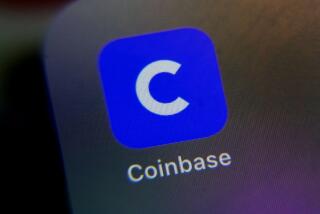Newport Beach precious metal dealer Monex accused of $290-million fraud

A federal regulator is accusing Monex, a Newport Beach precious metals investment firm, of defrauding thousands of customers of more than $290 million through an illegal scheme that used high-pressure sales tactics and left many elderly clients with no life savings.
In announcing the complaint, filed Wednesday in U.S. District Court in Illinois, the U.S. Commodity Futures Trading Commission called the alleged fraud “one of the largest precious metals” cases it has filed, involving the holders of some 12,000 accounts from July 2011 until this March.
The commission alleged the company set up its so-called Atlas program in a way in which it profits, but “customer losses are all but inevitable.” It cited several examples of elderly customers who lost more than $100,000 each.
Monex, in a statement, denied any allegations of fraud and said that the terms of its trading program are publicly disclosed. It also disputed that the commission had any jurisdiction over the firm.
“The company will vigorously defend the CFTC’s unwarranted action,” the statement read.
The commission’s case focuses on leveraged trades of gold, silver, platinum and palladium that allow retail clients to make investments with money they borrowed from the firm through its Atlas trading platform.
The complaint alleges that the firm, owned by the father and son duo of Louis and Michael Carabini, made most of its revenue by controlling the price at which its customers bought and sold gold, silver and other precious metals.
The difference, or spread, between the price set by the firm and the underlying price on tracked spot markets was generally about 3%, the commission said. That means, according to an example cited in the complaint, it would cost a Monex customer $2,550 to trade 5,000 ounces of silver, versus $25 to enter into a substantially similar futures contract on one regulated exchange.
Compared to trades on a regulated exchange, the commission alleged Monex charged “outsized price spreads, commissions, interest on loans, and administrative fees.”
To boost its sales, Monex ran television campaigns and deployed a telephone sales force that promised its Atlas program was a safe and secure way to shield customers’ wealth from inflation, the complaint alleged.
The company trained its sales force using scripts that minimize risk and emphasized the “profit potential and security” of the investment, the complaint said.
“If gold were to increase in value by $100 per ounce in the next year, and you had a 30% to 40% net gain, you’d feel pretty good, wouldn’t you?” was one phrase the complaint said employees were encouraged to use.
But customers in the Atlas program lost big, a fact Monex shielded from prospective clients, the commission said. About 90% of all leveraged Atlas accounts lost money from July 2011 through the end of March, according to the complaint.
Sales representatives were paid commissions and bonuses based on the number of accounts they opened and the size of the transactions in the accounts, not by how much clients earned, the commission alleged.
In addition to the company, the commission accused Monex owners Louis Carabini and his son Michael of committing fraud and operating an unlawful leveraged commodity platform that was not registered with the commission.
The commission has asked a judge to stop the company from continuing to offer the leveraged commodities trades to retail clients. It is also seeking to have Monex provide full restitution to harmed customers and to disgorge any ill-gotten gains.
This is not the first time Monex or the Carabinis have faced legal troubles.
The company faced a 2004 class-action lawsuit that alleged Monex misled its customers and resulted in a $150,000 payment to class members. And in 1974 the Securities and Exchange Commission alleged that Louis Carabini obtained $1 billion through deceptive sales of silver coins on margin.
Follow me @khouriandrew on Twitter
More to Read
Inside the business of entertainment
The Wide Shot brings you news, analysis and insights on everything from streaming wars to production — and what it all means for the future.
You may occasionally receive promotional content from the Los Angeles Times.











